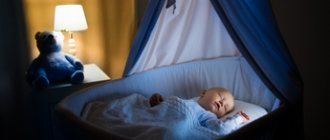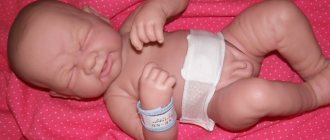Parents often face quite often the problem of insomnia in children. If you observed only one episode when your child tossed and turned and could not sleep, this is not insomnia. You can talk about sleep disturbance only if this happens regularly. Typically, insomnia (sleep disturbance) has a negative impact on the child’s well-being and reduces the quality of life. Let's learn more about insomnia in children: how to recognize it, why it occurs, and how treatment is carried out. We will also consider modern methods of treating such a disorder at the South Clinic Sleep Medicine Clinic.
Insomnia and its symptoms
Each of us can experience problems with falling asleep, but with babies everything is more complicated. Without getting enough sleep themselves, they will not allow their parents to get enough sleep. Falling asleep occurs in 5 stages:
- Superficial sleep. The person is still sensitive to the environment and may wake up frequently.
- There is a decrease in brain rhythms and heart rate.
- Deep phase. There is an interweaving of delta waves with short, fast waves. During this period, a person enjoys dreams.
- The predominance of delta waves is noted. Having woken up for seconds, the baby does not immediately realize where she is.
- Fast phase. The sleeper's eyes move quickly. The brain is preparing for activity.
Insomnia in an 8-year-old child can be determined in cases where the child:
- has trouble falling asleep;
- wakes up too early (3 am). After this he finds it difficult to sleep;
- often wakes up in the middle of the night.
Even at 9 years old there may be minor sleep disturbances, which over time turn into chronic insomnia. In this case, the following signs of insomnia may be observed:
- significant hyperactivity;
- early awakening, after which a person walks sleepy all day;
- It is difficult for schoolchildren to concentrate on homework and lessons at school;
- possible manifestation of aggression;
- difficulties arise when remembering new information;
- frequent mood changes;
- errors become more frequent when performing certain tasks or tasks due to inattention;
- there may be problems with discipline in an educational institution or at home;
- irritability.
After the night, the baby looks tired and feels sleepy all day. With such symptoms, doctors can even talk about diabetes, anemia, autoimmune diseases, and colds.
Consequences of childhood insomnia
Insomnia for children is a dangerous disease; it leads to disruption of developmental processes and affects the formation of social habits that are formed during this period and will be needed by the child throughout his life.
A sleep disorder affects the physical and mental health of an infant. The child learns more slowly and development is inhibited. If a child suffers from lack of adequate sleep since childhood, there is a high probability of illness in adulthood.
School-age children who lack sleep, are lethargic and tired, learn much worse than their peers. Due to constant irritation, they are more prone to depression and moments of crisis.
Loss of strength and fatigue, and as a result, weakening of the child’s body’s immunity lead to frequent illnesses and infections with viruses. Normal sleep prevents exacerbation of the disease, and insomnia in childhood provokes neuroses and psychoses. Problems appear in the functioning of the cardiovascular system.
Reasons for the deterioration in the quality of rest
In rare cases, insomnia in children occurs for no reason. It can also be the result of various disorders. The main causes of insomnia are listed below:
- diseases (neuroses, kidney disease, depression, hyperthyroidism, Parkinson's disease);
- taking certain medications;
- overeating at night;
- emotional outbursts;
- apnea;
- diseases of the endocrine system;
- home furnishings;
- consumption of caffeinated drinks (mainly in adolescents);
- diseases of a somatic and psychological nature.
Let us describe the most common causes of insomnia in more detail.
Stressful situations
Most often, insomnia in a 10-year-old child is provoked by stress. Stressful situations can be called the main cause of insomnia in adolescents. Stress is provoked by various factors: fears, conflicts with friends, classmates, parents, difficulties in learning. If the baby complains of poor sleep, you should listen to him carefully. This way it will be easier for you to find out what is happening in your child’s life.
If you notice a teenager's irritability, try to find out the reason for it. Assess the atmosphere in the house, take an interest in relationships with friends, and academic performance at school. You can additionally chat with his teachers, classmates or friends. Due to the significant emotional sensitivity of children, insomnia can be triggered by family quarrels.
Taking medications
If your baby is having trouble sleeping and is taking certain medications at the same time, consult your pediatrician. Sleep disturbance can be caused by taking the following medications:
- corticosteroids;
- anticonvulsants;
- antidepressants.
The listed groups of medications can not only cause sleep disturbances, but also provoke gastrointestinal tract disorders.
Psychological problems
Insomnia can occur in children with mental or psychological disorders. In this case, you should not postpone your visit to a specialist. Make an appointment with experienced psychologists and psychotherapists in Rostov-on-Don. Thanks to registration, you will not need to waste time standing in line. Your child will be examined by doctors of the first, highest category. We will accurately determine the cause of insomnia and select the treatment that is effective in your case.
Insomnia is often observed in children suffering from the following psychological disorders:
- anxiety;
- depression.
Also, do not forget about behavioral disorders. Sleep disturbances are common in attention deficit disorder.
Physiological disorders
Insomnia can also occur due to physiological problems. It is difficult for babies to sleep peacefully if they have the following conditions:
- fibromyalgia;
- chronic asthma;
- muscle cramps;
- respiratory tract diseases;
- sleep apnea (in this condition short-term pauses in breathing occur);
- flu.
Drinking caffeinated drinks
Sleep disorders can be triggered by caffeine intake, which is found in coffee, carbonated drinks, and energy drinks. Teenagers are more likely to experience insomnia for this reason. Insomnia is also possible due to nicotine.
Poor nutrition
Doctors do not recommend going to bed with a full stomach. Overeating is especially contraindicated. Eating meat dishes is accompanied by a feeling of heaviness in the stomach. If a teenager feels discomfort in the stomach, heartburn, he will not be able to fall asleep soundly. You should also not sleep hungry. It is recommended to eat food 2 – 3 hours before bedtime.
Biological clock failure
At the age of 9, parents already take children on long trips, after which the child experiences insomnia. Due to flights between different time zones, the biological clock may be disrupted. Also, during the flight, the teenager experiences an emotional surge - the joy of discovering new territories. He is looking forward to new acquaintances and an unusual vacation.
Snoring (apnea)
Insomnia can occur in a child as young as 8 years old due to breathing problems. Most often, doctors observe apnea in children, but adults are no exception. In older people, breathing problems can be caused by enlarged adenoids or injury to the nasal septum.
home furnishings
Normal rest is possible only in a quiet environment. Of course, quiet voices or noise on the street will not really interfere with sleep, but loud music, TV, or screams from family members can cause insomnia.
When children begin to have difficulty sleeping at night, the first thing parents attribute this problem to is insomnia. If the baby is less than a year old, then the lack of sleep can be associated with external factors that can affect sleep. But when a child is 2 years old or more, insomnia may indicate the presence of various disorders and diseases. Let's take a closer look at the causes and symptoms of this phenomenon.
Insomnia can be called a condition in which a person is unable to fall asleep at night, or wakes up in the middle of the night and is unable to go further into a sleepy state. He either doesn’t lie down at all and falls asleep in the morning, or when he wakes up at night he starts doing business because sleep no longer comes. Circadian rhythms are disrupted and in the future it becomes increasingly difficult to establish sleep.
If a child has insomnia, he may start playing in bed at night, call his parents, or even come to his mom and dad’s bedroom on his own and wake them up. This condition is due to the fact that a person is unable to enter the deep phase of sleep, in which physical recovery usually occurs and which in turn gives us strength for the next day.
When a child does not sleep for a couple of nights, this behavior has nothing to do with insomnia and most likely indicates that the daily routine has gone wrong, or that the baby is overexcited. And if the child is very small, then nighttime festivities may be associated with growth spurts. In the case when the baby does not sleep at night for 7 days or more, it makes sense to think about the fact that something may be bothering him.
Signs of insomnia in children:
- The child wakes up early in the morning and never goes back to sleep. During the day he becomes sleepy and looks tired and distracted.
- Makes basic mistakes in lessons at school and when doing homework.
- Shows aggression towards everyone.
- The child becomes uncontrollable.
- Frequent mood changes.
- Memory is lost, speech becomes incoherent, and the baby is unable to remember new information.
- He often wakes up at night and cannot sleep for too long.
- Goes to sleep at night with hysterics and resistance.
- Gaining excess weight.
As a rule, insomnia in children under one year of age is associated with an incorrectly structured rhythm of the day. In the first 3-4 months, the baby may confuse day and night; this behavior can often be confused with a sign of insomnia. To fix the problem, start building a predictable day for your child, namely: fix the morning rise, monitor the duration of wakefulness, as well as the amount of daytime sleep. If you couldn’t cope on your own, come to Tatyana Kremneva’s page. There you can find a lot of information on how to improve children's sleep.
Insomnia can occur for no particular reason, or it can indicate serious emotional and physiological problems. Causes of insomnia in children:
- Stress, depression, anxiety . Some of the most common reasons for lack of sleep in children. Depression, unlike all others, is protracted. The child becomes withdrawn. This is especially true for school-age children and teenagers. Problems with peers, misunderstandings with teachers. If you notice this in your child, talk to him. Many situations can be resolved through dialogue. Children tend to exaggerate certain moments and take them to heart. During the conversation, the baby may realize that the situation is not serious and there is no reason to worry. If necessary, you can talk to the teacher and ask for his point of view.
- Physiological problems . Chronic asthma, sleep apnea in children, respiratory disease, seizures and any other diseases. All of these problems affect a child's sleep. In order to diagnose and eliminate them in time, you need to immediately consult a doctor.
- Caffeine and nicotine consumption . Caffeine is found in sweet carbonated drinks that children love so much. It is necessary to reduce the consumption of sweet soda. As a substitute for sweet water, you can use homemade compote. If parents smoke, then children become passive smokers. To prevent your child from breathing smoke and subsequently having health problems, it is better to quit this bad habit. If you cannot cope with the addiction, then you need to leave the room and smoke outside so that the baby does not breathe.
- Situation at home . Children often take all quarrels and domestic conflicts to heart. It is necessary to ensure that the baby witnesses various domestic disputes as little as possible.
- Taking medications . If your baby takes pills due to certain circumstances, look at the side effects section. One of them may be insomnia.
In order to cure insomnia, medications are rarely used. Doctors try to the last minute to solve the situation by correcting behavior and lifestyle. You can cure the disease at home. To do this, it is necessary to diagnose the problem in a timely manner and immediately begin to solve it.
How to help your baby sleep if you have insomnia:
- Rhythm of the day . We build a predictable day. We do not give the child strong emotional and physical stress. More walks and being in the fresh air. We arrange (if necessary) a daytime nap. We observe the time of wakefulness. It is necessary to ensure that the baby does not sleep too much during the day; he may sleep most of the night, which will subsequently make the night shorter.
- Ritual . Together with your baby, we create a ritual for going to sleep. You can read a book, have a heart-to-heart talk, put all your favorite toys to bed. All activities before bed should be as calm as possible.
- Sleeping conditions . It is necessary that the temperature in the child’s bedroom is no higher than 22°C. The pajamas were made of natural fabric and did not press or sting the baby. Put a humidifier in your bedroom to help solve the problem of waking up at night. When the air is humidified, children sleep soundly and calmly. Use white noise. It helps children up to one year sleep well and perfectly drowns out household sounds. If your baby likes to sleep in silence, it needs to be created. An hour before bed, dim the lights and turn off all gadgets.
Unfortunately, there is no accurate diagnostic method to determine insomnia. If your child has one or more of the signs described above, and they manifest themselves over a long period, you need to help your baby cope with it. Consult your doctor for advice.
Author: Tatyana Kremneva.
Insomnia in young children
Newborns tend to fall asleep and wake up at any time of the day. This is explained by the fact that their biorhythms have not yet been adjusted. Short sleep at night or long sleep during the day is considered normal for up to 4 months. The main thing is that the child is active and cheerful. What to do if the baby stays awake at night after six months? It is worth paying attention to this and visiting a psychotherapist. Make an appointment with experienced specialists at the YUG Clinic.
Insomnia in young children is usually provoked by the following reasons:
- Failure to comply with hygiene at night (high/low temperature in the bedroom, bright lighting, low humidity, noise). Also, children may feel uncomfortable because their pajamas are too warm or their bed is too hard/too soft.
- Behavioral problems. Behavioral insomnia develops when the boundaries of what is permitted are violated or actions are performed in the wrong order. It is important to follow a pre-rest routine so that your child learns to prepare for relaxation and sleep.
If a child is used to falling asleep with a bottle, breast or pacifier, he will not fall asleep quickly if these aids are excluded. The installation process can become lengthy. This applies to infants up to 1.5 years old.
- Violation of sleep habits. When children grow up (2 years old), they actively explore the world. It is difficult for them to tear themselves away from interesting things and fall asleep. They push rest into the background. Getting them to rest can be difficult. If the baby wakes up at night and cannot sleep, he can be allowed to lie in his parents’ bed.
- Health problems. In infants in the first year of life, sleep disorders are possible due to colic, diaper rash, allergies, and neurological problems.
- Psychosocial problems. They are added as the baby grows older. Attending kindergarten and studying at school causes stress and increased emotionality.
Why does your baby not get enough sleep?
The reason may be:
- change in place of sleep and daily routine: the child sleeps either in his own bed, or with his mother, spends the night with his grandmother, you went south, moved to another city, etc.;
- physical influences of the environment: the room is stuffy, hot, the child is wearing uncomfortable clothes, light from the window falls on the crib;
- the baby is not feeling well: his stomach hurts, his nose is stuffy, his teeth are cutting, his breathing is impaired after a viral disease, etc.;
- The child woke up from hunger: the food he ate before bed was not enough.
Diagnosis of the pathological condition
First of all, insomnia in children is noticed by parents. They notice that the baby is tired and inattentive during the day. He may even complain of headaches. What to do when you suspect insomnia in a child? In this case, you should seek help from a pediatrician, somnologist, or psychotherapist. After examining and talking with the little patient, specialists refer him for further diagnostics.
Polysomnography is considered the most informative diagnostic method. A polysomnograph detects moments of changes in brain activity at moments when the subject is sleeping poorly or, for example, having nightmares. Thanks to polysomnography, doctors collect information about all functions occurring in the body overnight: the work of the heart, respiratory system, blood pressure.
The following research methods may also be needed:
- CT.
- MRI.
- EEG.
If a 10-year-old child has paroxysmal insomnia, the patient is referred for the following blood tests:
- Biochemical analysis.
- General analysis.










